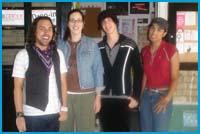“Queer Frosh is a week-long activity that’s organized to welcome LGBTQ-identified and questioning students to the University of Toronto,” says U of T LGBTQ (lesbian, gay, bi, trans, queer) programs assistant, David Pereira.
For queer university and college students the first year away from home can be a daunting experience but Joshua Wasserman is making the best of it.
“It’s been going a little more smoothly than I thought it would actually,” he says.
Of course Wasserman was curious about the social gatherings but past experience had him thinking twice about attending.
“Sometimes there is a bit of an impersonal feel to it,” he says.
On the Ryerson campus, RyePride Coordinator, Chris Wright says that it’s about letting new people know that they’re welcome anywhere in the community.
“Among other things we try to make sure that they come out and meet some people who are active members… and ask any questions they have about campus.”
This is done in many ways but both institutions organized a meet-and-greet to kick start the orientation week.
“We encourage our members to attend those as queer and trans people, just so they can know that there are allies on campus,” Wright says.
Allies such as RyePride and the LGBTQ Resource Office are very much invested in the interests of students and faculty on campus from an administrative standpoint.
“We strike the meeting so that students can get together and mobilize and start talking about queer orientation, but we by no means take credit for the events themselves,” Pereira says.
Student-run groups such as Lesbians Gays Bisexuals And Transgendered of The University of Toronto (LGBTOUT) are the ones who organize most of the events and give students their first experiences with queer culture in Toronto.
“We help them get acquainted…especially for first-year students who have never really been on campus before,” LGBTOUT coordinator, David Ivey says. “It gives them a sense of where they’re going and help them out a little bit.”
Wasserman started volunteering at the group’s office to meet new and interesting people, since then he has been introduced to many friends and acquaintances.
“The drop-in centre is located in the centre of campus right across from Sidney Smith Hall,” Ivey says. “It’s kind of the first place where a lot of students will get to encounter queer life on campus.”
Ivey says that the goal for them is to offer a place for those who aren’t necessarily feeling welcome or are nervous about meeting new people. So they encourage students to interact at the centre or during the events.
Wasserman is excited to learn as much as he can about the community while studying at U of T. LGBTOUT organizes tours where they visit famous queer sites on campus and teach the history of their organization.
“We started out as more of an advocacy group… It was the first queer group on any campus in Canada,” Ivey says. “But we are a group that still raises awareness about issues that affect the LGBTQ community.”
As for women getting involved on campus, two female student-volunteers, Jessica Parker and Mara Pereira say that the problem facing new female students is adversity.
“A lot of the queer groups on campus are male-dominated,” Parker says. “It can be difficult to find events that cater to women.”
The reason for not getting involved they figure is because of the need for more exclusive spaces on campus.
“If it’s not specifically for women and trans people than I think maybe a lot of women avoid it,” Pereira says.
One of the events this year hosted by the LGBTQ Resource Centre was called: “Where are all the Women?” which actually tries to address this issue.
Both Parker and Pereira agree that new students are in the same situation when they begin at university.
“It’s the overwhelming nature of the institution, that can be a difficult thing for first-years,” Parker says.
But so far Wasserman has been adapting relatively well considering it’s only been a few weeks.
“It seems to switch between being suddenly overwhelming,” he says. “Then it starts up again and everything is all hectic.”

 Why you can trust Xtra
Why you can trust Xtra


